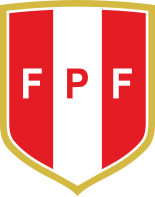 | |||
| Nickname(s) | La Bicolor (The Bicolour) La Blanquirroja (The White and Red) | ||
|---|---|---|---|
| Association | Federación Peruana de Fútbol | ||
| Confederation | CONMEBOL (South America) | ||
| Head coach | Francisco Castelo | ||
| Captain | Billy Velezmoro | ||
| FIFA code | PER | ||
| BSWW ranking | 32 | ||
| |||
| First international | |||
(Rio de Janeiro, Brazil; 18 January 1998) | |||
| Biggest defeat | |||
(Vitória, Brazil; 10 December 1999) | |||
| Copa América of Beach Soccer | |||
| Appearances | 5 (first in 2016 ) | ||
| Best result | Fifth place (2016, 2022) | ||
The Peru national beach soccer team represents Peru in international beach soccer competitions and is controlled by the FPF, the governing body for football in Peru.